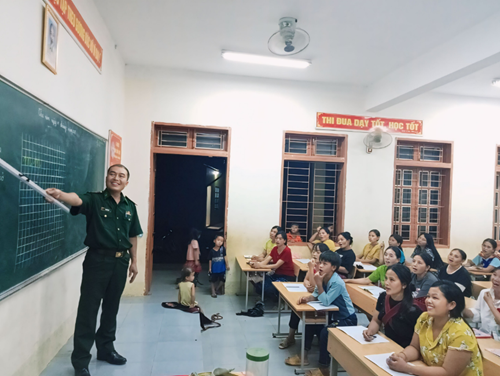At first, everything was new to them; however, they are all excited, as they want to be able to read and write so that they could develop the economy and soon escape poverty. This is the literacy class organized by Chieng Son Border Post under the Son La provincial Border Guard Command, in collaboration with Van Ho district's Division of Education and Training.
    |
 |
|
Non-commissioned Major Tran Van Phuc guiding students to read |
From Cot Moc village to Sa Lai village, many local people called non-commissioned Major Tran Van Phuc from Chieng Son Border Post “teacher Phuc.” This is the second time that Major Tran Van Phuc has been in charge of a literacy class in Tan Xuan commune.
Sa Lai village is home to nearly 500 people, all of them are H'mong ethnic people. With the investment of the local authority in infrastructure, the living standards of local people have been improved significantly. However, the rate of illiteracy remains high. Therefore, Chieng Son Border Post mobilized people to join literacy classes.
The class starts at 19:00. Most students in the class are women and they are all the breadwinners of their families. Previously, due to difficult conditions and customs, girls in the village were not allowed to go to school. The oldest "student" in the class is 50 years old, and the youngest is 19 years old. Moreover, there are three couples entering the class together. Many mothers have to carry their children while studying. “Student” Ly A Tru, aged 50, shared that thanks to the class, he and other students could read, write, and do some simple calculations.
According to non-commissioned Major Tran Van Phuc, the class has 47 students. It starts from 19:00 to 22:30 every evening from Monday to Friday. People in Sa Lai village are keen on learning; therefore, they learn to read and write quickly. In spite of the shortage of school supplies and documents, many people in remote areas signed up for the class.
Lieutenant Colonel Mai The Canh, a political officer from Chieng Son Border Post, shared that opening literacy classes is also an effective way to improve people's cultural standards, making it easier for troops to communicate with the locals. If they can read and write, they can understand reference books related to production, so that they could apply science and technology in production activities.
The most difficult thing is to mobilize people to join the class and maintain the number of students. Therefore, the unit closely coordinated with local authorities and several schools in the locality, together with promoting the role of reputable people in the village, to encourage people to sign up for the class. Meanwhile, the teachers in charge are those having experience in teaching and they have close-knit relations with local people.
After the class, Major Phuc reminded his students to remember to do their homework and try to speak Vietnamese with each other. On the way home, everyone loudly talked to each other in Vietnamese. Laughter and flickering beams of the flashlights in the darkness showed high determination and desire of H'mong ethnic people to learn how to read and write to together build a more prosperous village.
Translated by Quynh Oanh